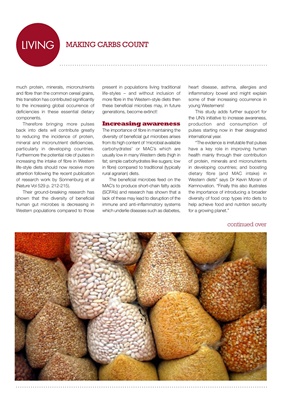
LIVINGLIVING
continued over
A Global Pulse
The following article was written by Dr
Kevin Moran, and originally appeared on
kemnovation.com on 18 January 2016.
'Not before time, 2016 has been called
'the international year of pulses' by the
United Nations (UN) placing a strong
focus on this under-valued but very
diverse group of crops, comprising mainly
beans and peas, in achieving future food
and nutrition security.
'It is a sad but real irony that during
the Green Revolution, in the second half
of the 20th century, production of pulse
crops declined greatly as that of common
cereal grains, such as wheat, maize
and rice, increased enormously. And, as
pulses usually contain about twice as
much protein, minerals, micronutrients
and fibre than the common cereal grains,
this transition has contributed significantly
to the increasing global occurrence of
deficiencies in these essential dietary
components.
Therefore bringing more pulses
back into diets will contribute greatly
to reducing the incidence of protein,
mineral and micronutrient deficiencies,
particularly in developing countries.
Furthermore the potential role of pulses in
increasing the intake of fibre in Western
life-style diets should now receive more
attention following the recent publication
of research work by Sonnenburg et al
(Nature Vol 529 p. 212-215).
Their ground-breaking research has
shown that the diversity of beneficial
human gut microbes is decreasing in
Western populations compared to those
present in populations living traditional
life-styles - and without inclusion of
more fibre in the Western-style diets then
these beneficial microbes may, in future
generations, become extinct!
Increasing awareness
The importance of fibre in maintaining the
diversity of beneficial gut microbes arises
from its high content of 'microbial available
carbohydrates' or MAC's which are
usually low in many Western diets (high in
fat; simple carbohydrates like sugars; low
in fibre) compared to traditional (typically
rural agrarian) diets.
The beneficial microbes feed on the
MAC's to produce short-chain fatty acids
(SCFA's) and research has shown that a
lack of these may lead to disruption of the
immune and anti-inflammatory systems
which underlie diseases such as diabetes,
heart disease, asthma, allergies and
inflammatory bowel and might explain
some of their increasing occurrence in
young Westerners!
This study adds further support for
the UN's initiative to increase awareness,
production and consumption of
pulses starting now in their designated
international year.
"The evidence is irrefutable that pulses
have a key role in improving human
health mainly through their contribution
of protein, minerals and micronutrients
in developing countries; and boosting
dietary fibre (and MAC intake) in
Western diets" says Dr Kevin Moran of
Kemnovation. "Finally this also illustrates
the importance of introducing a broader
diversity of food crop types into diets to
help achieve food and nutrition security
for a growing planet."